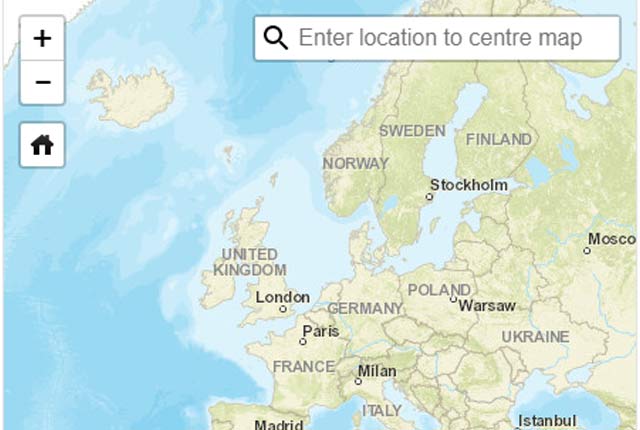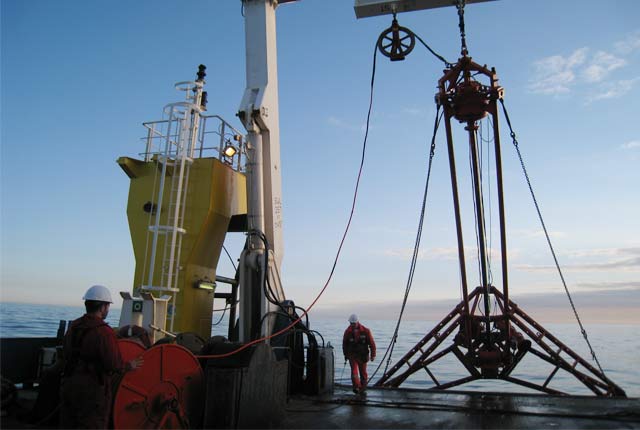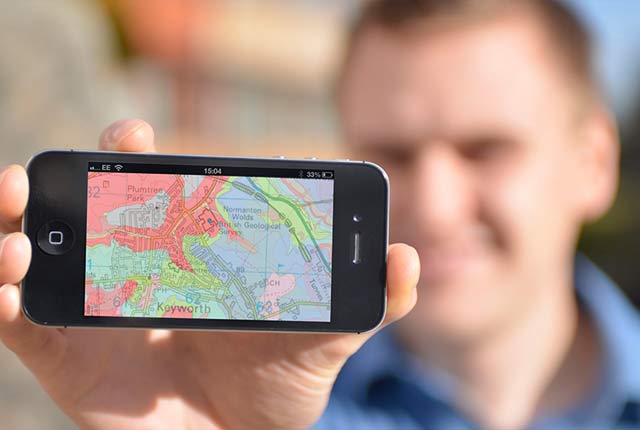National Geoscience Data Centre (NGDC) collects and preserves geoscientific data and information, making them available for the long-term to a wide range of users and communities. NGDC is recognised as the NERC Environmental Data Centre for geoscience data.
NGDC is responsible for managing geoscientifically valuable information and datasets. The data it holds covers many geological disciplines dealing with the physical structure of the Earth and the processes that act on it, as measured from geological time to near-real-time sensor and data streams. It is NGDC policy to preserve this data, which underpins the existing scientific record, and make it accessible for future re-use to a wide range of user communities.
It is the policy of NGDC to store data that is:
- of high quality, scientifically significant and of potential research or commercial interest to scientists, academics or policymakers in the future
- a geoscience data output from NERC/UKRI-funded earth science projects and programmes
- digitally borne, enabling easy future re-use and access by a diverse range of end-user communities
- preserved in the long term to maintain its accessibility and usability by taking appropriate digital-preservation actions throughout the data lifecycle
- deposited by the owner or someone who has the rights to donate the data to NGDC (therefore granting NGDC a non-exclusive ‘in-perpetuity licence’ to hold and disseminate the data)
- compliant with our data policy and data value checklist
It is also the statutory responsibility of NGDC to receive data associated with:
- boreholes drilled from the surface to a depth of more than 30 m for mineral exploration or extraction purposes (Mining Industry Act 1926)
- boreholes drilled deeper than 15 m for water(Water Resources Act 1991 and Water (Scotland) Act 1980)
- hydrocarbon well data (as per PON9/9b)
It is the policy of NGDC to ensure data is deposited with the following:
- standards-compliant metadata that explains the dataset, makes it easy to discover and facilitates re-use
- terms and conditions that clearly define how the data can be used in the future (NGDC prefers to hold data with no access or use restrictions — ‘open data’)
It is the policy of NGDC to:
- store a copy of the data ‘as supplied’ in a data-holding store (in an agreed format)
- incorporate (when funding permits) the data within our existing, nationally consistent datasets
- provide data management advice and guidance to geoscientists working on earth science projects
- ensure the data is discoverable and provide open access to any unrestricted data held in the data-holding store or the nationally consistent datasets
- create on request digital object identifiers (DOIs), facilitating data citation, for appropriate digital datasets and display these alongside the data
- encourage the use of these datasets for a full range of academic and commercial purposes, including future scientific projects and within information products or decision support systems
- All those drilling boreholes covered by statute, or those wishing to donate information on a voluntary basis, must complete a notification of intent to construct new wells and boreholes and the subsequent provision of information form.
- Guide to the Mining Industry Act 1926, which covers all boreholes drilled for minerals reaching a depth of more than 30 m. Please contact ngdc@bgs.ac.uk for more information.
- Guide to the Water Resources Act 1991, which covers all drilling related to water over 15 m. Please contact ngdc@bgs.ac.uk for more information.
- Information for funded NERC/UKRI-researchers — further information about depositing data with the NGDC for NERC/UKRI-funded researchers
- NERC/UKRI data policy — NERC/UKRI has a well-established data policy that sets the ground rules that all those funded by NERC/UKRI must follow in managing the data that they collect.
- BGS has adopted a research data management policy to provide researchers with a structure to help them to manage their research data effectively and following good practice. This leads to resilient and robust data assets of long-term value to be deposited at NGDC.
- NGDC has a digital preservation policy to ensure the long-term continuity of digital geoscience data in its care.
- The Open Government Licence (OGL) is a simple set of terms and conditions that facilitates the re-use of a wide range of public sector information free of charge.
FAQs
How do I deposit my data with NGDC?
All data should be deposited through the NGDC Digital Data Deposit application. This will enable us to capture the necessary contact information, metadata and the terms and conditions of the deposit. Please follow the simple step-by-step process. Guidance is available on the application.
My data is over the recommended size limit; how do I deposit it?
At the ‘upload files’ page of the application, check the box that states that you are ‘not uploading any files’ and put in ‘Description of contents’ how you’ll be delivering/transferring the data. Our preferred method of data transfer is via a ShareFile link, which can be requested from NGDC.
Where do the liabilities lie with deposited data?
The NGDC terms and conditions include a liability statement for both depositors and users of our data. In summary, the use of information provided by NGDC is at the users own risk, therefore there is no liability to BGS, the data creator or the owner.
How do I request a DOI for my data?
After submitting your data via the application and receiving your email confirmation, please email your DOI request to NGDC (ngdc@bgs.ac.uk) quoting the BGS submission ID.
Can I send paper records to NGDC?
We prefer to receive and store digital data through the application. If you wish to deposit hard copy (paper) records, which are unique and have no access or use restrictions, please contact NGDC (ngdc@bgs.ac.uk) and provide a description including the quantity of records. When we have assessed these data against the policies and NGDC data value checklist, we will contact you to let you know whether NGDC can accept them.
What can I do if I know a borehole record has not been deposited with NGDC?
BGS is named in several legal statutes and Acts of Parliament (both in England and Scotland) that require the deposit of mineral or water borehole records, however BGS does not have the resource to chase or seek out boreholes that have not been deposited with NGDC.
If you have access to the borehole record you can deposit it via the application, or you can remind the organisation of their obligations. <!–For water boreholes, you can also use the NGDC water borehole form to fill out the borehole information and deposit it through the data deposit application.–>
Contact
Please contact NGDC (ngdc@bgs.ac.uk) if you need any help.
Where can I view my deposited data and how will it be used by others in the future?
Data deposited with the NGDC will be made available under the terms of deposit via one or more of our online search facilities:
‘Open’ data will be made freely available to a wide range of users and communities. This is at the user’s own risk, therefore there is no liability to BGS, the data creator or the owner.
Is there a scan-on-demand service for paper records held in NGDC?
If you would like a scan of a hard copy (paper) record, please contact our contact BGS Enquiries (enquiries@bgs.ac.uk).
Can I find out if a notification to drill has been submitted to BGS?
The information submitted via the online notification to drill system is held confidentially. When borehole records have been deposited, after drilling, these will be available via the deposited data search and the GeoIndex.
Contact
Please contact NGDC (ngdc@bgs.ac.uk) if you need any help.
Do you have a record of my well or spring?
You can view scans of the records of wells, boreholes and springs that BGS holds using the GeoIndex. Please bear in mind that, because many historic wells have not been recorded, the records are not comprehensive. This means that you may not find the well you are looking for in our records.
More recent borehole records may be in our deposited data search and offshore wells can be found in the offshore GeoIndex.
If we do not hold a record of your well, we would be keen to receive the details. You can deposit your driller’s log via the NGDC Digital Data Deposit Application.
Other sources of information:
- old wells and pumps are often shown on the historic, large-scale Ordnance Survey maps. These may be marked with W (well), P (pump) or Spr (spring) although, depending on the age of the map, these symbols may have been used for other features. You can access a selection of these maps on the National Library of Scotland website. As with BGS records, these may not be complete.
- county water supply memoirs (available for parts of England).
- the Environment Agency holds records of licensed boreholes and local authorities’ records of private water supplies, but this information may not be in the public domain.
Is it possible to bring an old well back into use?
We would advise contacting a member of the Well Drillers Association for advice on recommissioning an old well. You will need to apply for an abstraction licence from the Environment Agency or Natural Resources Wales if you intend to abstract more than 20 m3/d of water in England or Wales.
In Scotland, please consult the Scottish Environmental Protection Agency (SEPA) to make an appropriate application to abstract more than 10 m3/d of water.
How do I decommission a borehole or make an old well safe?
SEPA provides guidance on decommissioning a well or borehole.
Some members of the Well Drillers Association can provide well-decommissioning services.
You should also advise BGS when decommissioning a well or borehole (and include brief details of the methodology used) so that we can update our records.
Contact
Please contact BGS Enquiries (enquiries@bgs.ac.uk) if you need any help.
What is BGS’s remit and what are the driller’s obligations when drilling a water borehole?
BGS is named in several legal statutes and Acts of Parliament (both in England and Wales and Scotland). Under the legislation, BGS must be provided with notification of drilling before drilling commences for any borehole more than 15 m deep and the subsequent records of the drilling must be deposited through the NGDC Digital Data Deposit Application using the borehole record form.
If you are intending to abstract more than 20 m3/d in England and Wales, you will need to apply for an abstraction licence from the Environment Agency or Natural Resources Wales. In Scotland, please consult the SEPA website to make an appropriate application to abstract more than 10 m3/d.
Your local council’s Environmental Health department can advise on appropriate water quality testing. The Drinking Water Inspectorate website provides more information on private water supplies in England and Wales. In Scotland, this function is carried out by the Drinking Water Quality Regulator.
Note: BGS is not the statutory authority with regard to groundwater resources, protection and abstraction in the UK, therefore BGS cannot give permission to drill.
BGS cannot provide information regarding the necessary planning permission. These enquiries should be directed to the relevant local authority.
How and when do I submit a notification to drill ?
Please submit your notification to drill prior to the commencement of drilling using the notification of intention to drill form. The subsequent records of the drilling must be deposited through the NGDC Digital Data Deposit Application.
Whose responsibility is it to deposit the record of a water well?
Please see the relevant section of the Water Resources Act. In summary, if a drilling contractor is used, it is the contractor’s responsibility to deposit the record via the digital data deposit application. Otherwise, it is the responsibility lies with whoever owns the land, any tenant or occupier.
What guidance can BGS provide regarding borehole locations, construction and water quality?
BGS offers a site-specific water borehole prognosis report service.
If I drill a borehole will it provide a groundwater supply?
To obtain a groundwater supply, there needs to be an aquifer present. This is a superficial deposit or bedrock formation that can yield water; the best aquifers are generally sandstones, limestones and well-fractured rocks. Mudstones do not typically yield useful supplies of groundwater. You can find out if you are likely to be able to abstract water by ordering a water borehole prognosis report for your site.
How do I order a site-specific water borehole prognosis?
Interpreting all the information is complicated and BGS offers a site-specific water borehole prognosis report service. This gives an evaluation of the geological formations beneath the site in terms of aquifer potential, including yields, water levels and groundwater quality. It also contains recommendations on the design of the proposed water borehole and information on the legal requirements.
How do I get my borehole/well/spring water-quality tested?
Your local Environmental Health department will be able to advise on what tests need to be carried out and laboratories that can undertake the work.
The Drinking Water Inspectorate website provides more information on private water supplies in England and Wales, and the Drinking Water Quality Regulator in Scotland.
What groundwater information can I access freely online?
The GeoIndex and BGS Geology viewer show the uppermost superficial and bedrock geology present. However, there may be different (and unmapped) types of rocks present between and beneath them. The scanned 1:50 000 geological maps include diagrams that indicate the relationship between the different formations and their thicknesses.
The GeoIndex and deposited data search also provide access to scans of nearby borehole records that contain information on the underlying geology; some also contain details of water levels, yields and water quality, although the level of detail will vary.
BGS has also published hydrogeological maps covering some of the main aquifers in the UK, which provide information on water levels, yields and water quality.
Contact
Please contact NGDC (ngdc@bgs.ac.uk) if you need any help.
- Please see NERC grants resources
Access the NGDC

Deposit data with NGDC
Guidelines for depositing data with NGDC.

Search deposited data
Discover data that has been ingested by the National Geoscience Data Centre (NGDC) and the National Geological Repository (NGR).

NGDC data management
We maintain a wealth of data, information and other materials gathered throughout the history of the organisation.

NGDC cited data
How to get a digital object identifier (DOI) for a dataset for your dataset in the NGDC cited data catalogue.

OpenGeoscience
Accessing maps and downloading data, scans, photos and other information via BGS’s free OpenGeoscience service.

